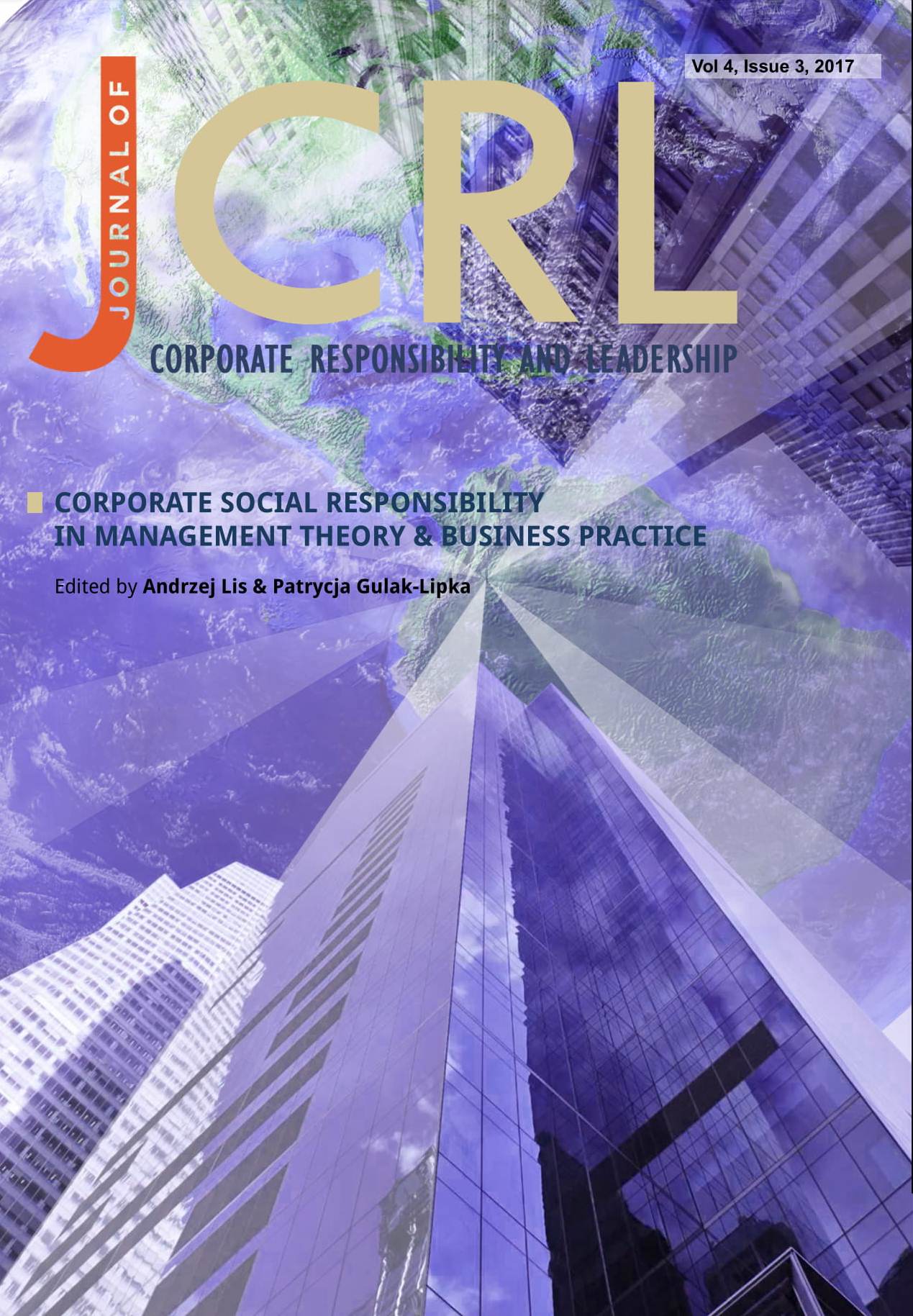Triple Bottom Line: The Pillars of CSR
DOI:
https://doi.org/10.12775/JCRL.2017.018Keywords
corporate social responsibility, Triple Bottom Line, people, profit, planetAbstract
Purpose: The aim of this paper is to discuss the areas of CSR and analyse their elements to better understand the concept.
Design/methodology/approach: To analyse the elements of the Triple Bottom Line model as a categorization of CSR areas and compare it with another models.
Findings: Relations between Triple Bottom Line and other cate-gorizations of CSR areas.
Research and practical limitations/implications: The article is theoretical and can be a base for future research. Nevertheless, the unsystematic research sampling should be considered a limitation of the study.
Originality/value: The article focuses on Triple Bottom Line and studies this concept in relation to other classifications. It has particular value in situation when the policy concerning CSR is obligatory for companies operating in the European Union area.
Paper type: literature review.
References
Balina, R. (2016), “Does the Gender of a Bank’s President Have an Effect on Financial Performance? A Case Study of Poland’s Cooperative Bank Sector”, Journal of Corporate Responsibility and Leadership, Vol. 3, Issue 2, pp. 9 – 22.
Banjerjee, S.B. (2007), Corporate Social Responsibility: The Good, the Bad and the Ugly, Edward Elgar Publishing Limited, Cheltenham.
Belak, J., Duh, M. (Eds.) (2017), Ethics, Social Responsibility and Innovation in Corporate Governance, Cambridge Scholars Publishing, Newcastle upon Tyne.
Bridgestone CSR Report (2012). Retrieved from http://www.bridgestone.com/respon-sibilities/csr/report/download/ (accessed 19 July 2015).
Cane, N. (2013), “What is The Triple Bottom Line?”. Retrieved from https://natecate. wordpress.com/2013/04/10/what-is-the-triple-bottom-line/ (accessed 29 June 2015).
Ceglińska, M., Cegliński, P. (2014), “Motives for Consideration of CSR Concept Assumptions for Building a Business Strategy”, Journal of Corporate Responsibility and Leadership, Vol. 1, Issue 1, pp. 9 – 20.
European Commission (nd), “Non-financial Reporting”. Retrieved from https://ec.euro-pa.eu/info/business-economy-euro/company-reporting-and-auditing/company-re-porting/non-financial-reporting_en, (accessed 04 January 2018).
Friedman, J. (2013), “Milton Friedman Was Wrong About Corporate Social Respon-sibility”. Retrieved from https://www.huffingtonpost.com/john-friedman/milton-friedman-was-wrong_b_3417866.html (accessed 19 November 2017).
Gołaszewska-Kaczan, U. (2009), Zaangażowanie społeczne przedsiębiorstwa, Wydawnictwo Uniwersytetu w Białymstoku, Białystok.
Gupta, A. (2011), “Triple Bottom Line (TBL a” 3BL)”, SAMVAD International Journal of Management, Vol. 2, pp. 71 – 77.
Handy, C. (2002), “What’s a Business For?”, Harvard Business Review, December.
Hernik, J. (2014), “Diversity as a Base of an Innovative Model of Business”, Cross Cultural Business Conference 2014: Proceedings, Shaker Verlag, pp. 39 – 47.
Hernik, J., Minguez Vera, A. (2016), “Women on Managing Boards – Are Companies More Responsible When Women Share the Power?”, Organisational Studies and Innovation Review, Vol. 2, No. 4, pp. 57 – 63.
Hernik, J., Minguez Vera, A. (2017), “Searching for a Perfect Composition for a Board of Directors”, Journal of Corporate Responsibility and Leadership, Vol. 4, Issue 1, pp. 19 – 38.
Idowu, S.O., Louche, C., Filho, W.L. (2010), “Innovative Corporate Social Responsi-bility: An Introduction”, in: Louche C., Idowu, S.O., Filho, W.L. (Eds.), Innovative CSR: From Risk Management to Value Creation, Greenleaf Publishing Limited, Sheffield, pp. 7 – 15.
Karaszewski, R., Lis, A. (2014a), “Is Leadership an Antecedent of Corporate Social Responsibility: A Study in the Context of Positive Organisational Potential”, Journal of Corporate Responsibility and Leadership, Vol. 1, Issue 1, pp. 53 – 70.
Karaszewski, R., Lis, A. (2014b), “Przywództwo i CSR w kontekście pozytywnego potencjału organizacji”, Marketing i Rynek, No. 5, pp. 1056 – 1062.
Księżak, P. (2016), “The CSR Challenges in the Clothing Industry”, Journal of Corporate Responsibility and Leadership, Vol. 3, Issue 2, pp. 51 – 65.
Maj, J. (2017), “Diversity Management Instruments in Polish Organizations”, Journal of Corporate Responsibility and Leadership, Vol. 4, Issue 1, pp. 39 – 54.
Moon, J. (2014), Corporate Social Responsibility: A Very Short Introduction, Oxford University Press Inc., New York.
Mullerat, R. (2010), International Corporate Social Responsibility: The Role of Corporations in the Economic Order of the 21st Century, Kluwer Law International, Alphen aan den Rijn.
Muthu, S.S. (Ed.) (2017), Textiles and Clothing Sustainability: Sustainable Fashion and Consumption, Springer, Singapore.
Porter, M.E., Kramer, M.R. (2006), “Strategy and Society: The Link Between Compet-itive Advantage and Corporate Social Responsibility”, Harvard Business Review, December, pp. 78 – 93.
Skrzypczyńska, K. (2013), “Corporate Social Responsibility as an Indicator of the Company Positive Organisational Potential”, in: Stankiewicz, M.J. (Ed.), Positive Management: Managing the Key Areas of Positive Organisational Potential for Company Success, Dom Organizatora TNOiK, Toruń, pp. 261 – 286.
Skrzypczyńska, K. (2014), “Social Responsibility of Companies Operating in Poland”, Journal of Corporate Responsibility and Leadership, Vol. 1, Issue 1, pp. 71 – 84.
Uddin, M.B., Hassan, M.R., Tarique, K.M. (2008), “Three Dimensional Aspects of Corporate Social Responsibility”, Daffodil International University Journal of Business and Economics, Vol. 3, No. 1, pp. 199 – 212.
United Nations Global Compact (nd), “The Ten Principles of the UN Global Compact”. Retrieved from https://www.unglobalcompact.org/what-is-gc/mission/principles (accessed 28 December 2017).
Visser, W., Tolhurst, N. (Eds.) (2010), The World Guide to CSR: A Country-by-Coun-try Analysis of Corporate Sustainability and Responsibility, Greenleaf Publishing Limited, Sheffield.
Wieczorek-Szymańska, A. (2017), “Organisational Maturity in Diversity Management”, Journal of Corporate Responsibility and Leadership, Vol. 4, Issue 1, pp. 79 – 91.
Downloads
Published
How to Cite
Issue
Section
Stats
Number of views and downloads: 18080
Number of citations: 0



